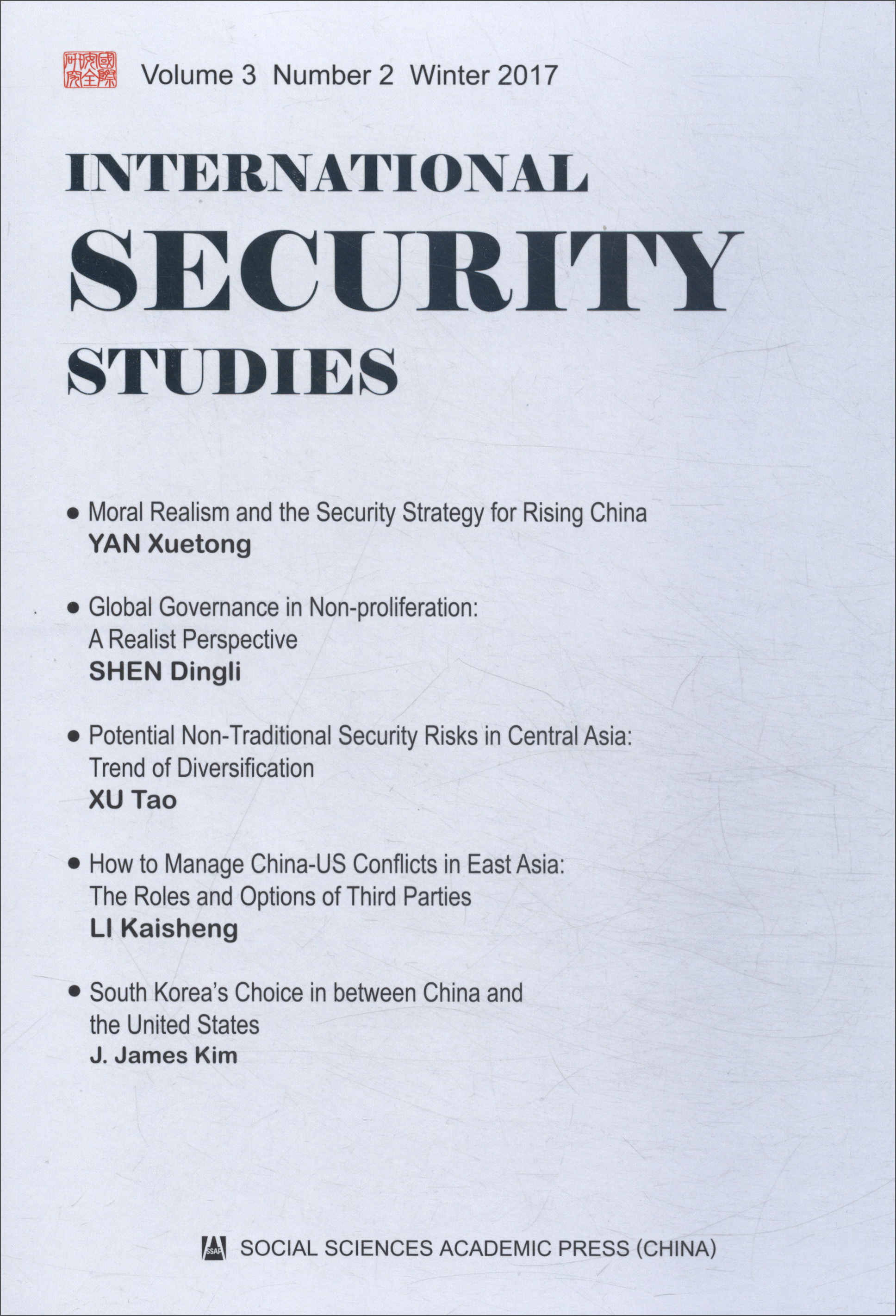#电子书截图
#电子书简介
《国际安全研究(2017年 第2辑 英文版)》:
It takes three strategic stages for a major country to rise: preparation, taking-off and surpassing. Therefore, rising states should adjust their specific strategic goals according to the changes in their own status of national strength. The world economic crisis in 2008 led to a relative decline in the strength of the US and other major Western countries, while China's strength ascended to 2nd in the world after 2010. During the Neighborhood Diplomacy Work Conference in 2013, the goal of China's foreign policy strategy was modified from "a peaceful environment for economic growth" to "a favorable surrounding environment for national rejuvenation". In this meeting, it was proposed that, "doing well in neighborhood diplomacy is necessary for China to achieve the Two Centenary Goals and realize the great rejuvenation of the Chinese nation. We should promote neighborhood diplomacy to win a sound neighboring environment for China's development, which will also benefit neighboring countries to achieve common development,,.12 This newly established goal is in compliance with the fact that China's comprehensive national strength has risen to 2nd place in the world. Because of the adjustment of strategic goals, there was corresponding adjustment in the strategy to achieve these goals, from "keeping a low profile" to "striving for achievement".
The strategic principle of striving for achievement is built upon the foundation that China has become the second largest power in the world. Therefore, each specific strategic goal of this strategy should match this foundation. This means that China's policies should not exceed the capacity of the 2nd largest power in the world, and that policies should not be made as if it is the largest power in the world. Specifically speaking, it means that the strategic actions of the US cannot be used as the standard for China's strategies. The strategic principle of striving for achievement means that China should shoulder its international responsibility by providing international public goods, but no more than that provided by the US. In the case of greenhouse gas emission reduction under global governance, China should provide less aid than the US for global C02 emission reduction. If the policies of China are made according to the standard of US policies, the inadequacy in capabilities will lead to weakened national strength and strategic deficit for China. MRT believes that making policies beyond the capacity of national strength is not striving for achievement, but vanity. As the comprehensive national strength of a country is constantly changing, MRT believes that a rising state needs to adjust its foreign strategy in a timely manner, according to the changes in its status ofnational strength.
……
It takes three strategic stages for a major country to rise: preparation, taking-off and surpassing. Therefore, rising states should adjust their specific strategic goals according to the changes in their own status of national strength. The world economic crisis in 2008 led to a relative decline in the strength of the US and other major Western countries, while China's strength ascended to 2nd in the world after 2010. During the Neighborhood Diplomacy Work Conference in 2013, the goal of China's foreign policy strategy was modified from "a peaceful environment for economic growth" to "a favorable surrounding environment for national rejuvenation". In this meeting, it was proposed that, "doing well in neighborhood diplomacy is necessary for China to achieve the Two Centenary Goals and realize the great rejuvenation of the Chinese nation. We should promote neighborhood diplomacy to win a sound neighboring environment for China's development, which will also benefit neighboring countries to achieve common development,,.12 This newly established goal is in compliance with the fact that China's comprehensive national strength has risen to 2nd place in the world. Because of the adjustment of strategic goals, there was corresponding adjustment in the strategy to achieve these goals, from "keeping a low profile" to "striving for achievement".
The strategic principle of striving for achievement is built upon the foundation that China has become the second largest power in the world. Therefore, each specific strategic goal of this strategy should match this foundation. This means that China's policies should not exceed the capacity of the 2nd largest power in the world, and that policies should not be made as if it is the largest power in the world. Specifically speaking, it means that the strategic actions of the US cannot be used as the standard for China's strategies. The strategic principle of striving for achievement means that China should shoulder its international responsibility by providing international public goods, but no more than that provided by the US. In the case of greenhouse gas emission reduction under global governance, China should provide less aid than the US for global C02 emission reduction. If the policies of China are made according to the standard of US policies, the inadequacy in capabilities will lead to weakened national strength and strategic deficit for China. MRT believes that making policies beyond the capacity of national strength is not striving for achievement, but vanity. As the comprehensive national strength of a country is constantly changing, MRT believes that a rising state needs to adjust its foreign strategy in a timely manner, according to the changes in its status ofnational strength.
……
Moral Realism and the Security Strategy for Rising China
Global Governance in Non-proliferation: A Realist Perspective
Potential Non-Traditional Security Risks in Central Asia: Trend of Diversification
How to Manage China-US Conflicts in East Asia: The Roles and Options of Third
Parties
South Korea's Choice in between China and the United States
Transformation of Asia-Pacific Security Architecture and ASEAN's Role
A Study of Cultural Security under Temporal Dimensions
Language Habits and Security Dilemmas: Thinking beyond Materialism
and Rationalism
Global Governance in Non-proliferation: A Realist Perspective
Potential Non-Traditional Security Risks in Central Asia: Trend of Diversification
How to Manage China-US Conflicts in East Asia: The Roles and Options of Third
Parties
South Korea's Choice in between China and the United States
Transformation of Asia-Pacific Security Architecture and ASEAN's Role
A Study of Cultural Security under Temporal Dimensions
Language Habits and Security Dilemmas: Thinking beyond Materialism
and Rationalism
《国际安全研究(2017年 第2辑 英文版)》是由国际关系学院主办的期刊。以加强战略思路,审视国际安全;维护国家利益为办刊宗旨,主要设有安全理论、安全战略和安全议题等栏目。
版权声明:本站提供的电子书下载/导购服务,如您发现侵犯了您的权益,请通过
举报侵权 进行处理 。











评论列表(0)